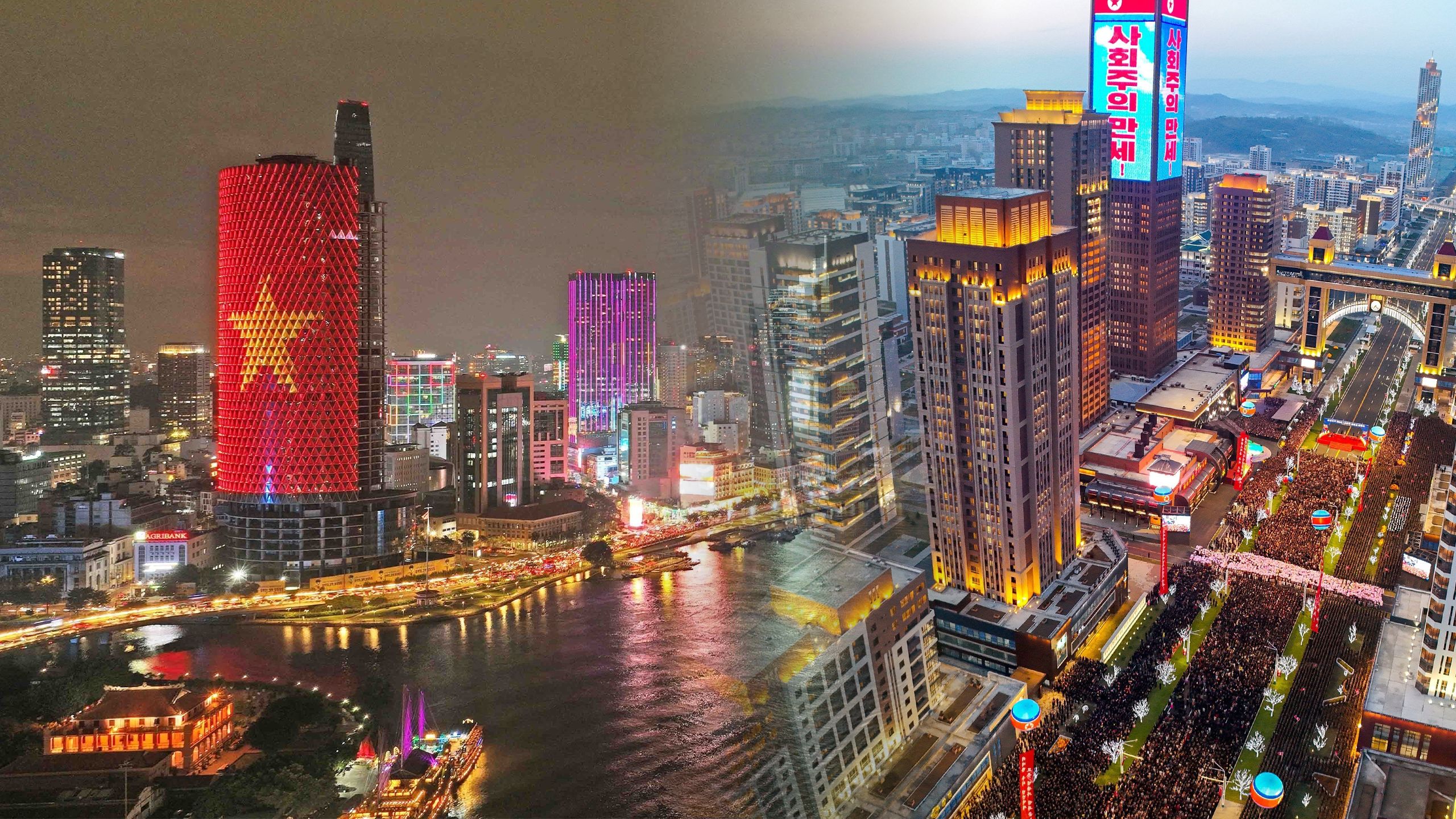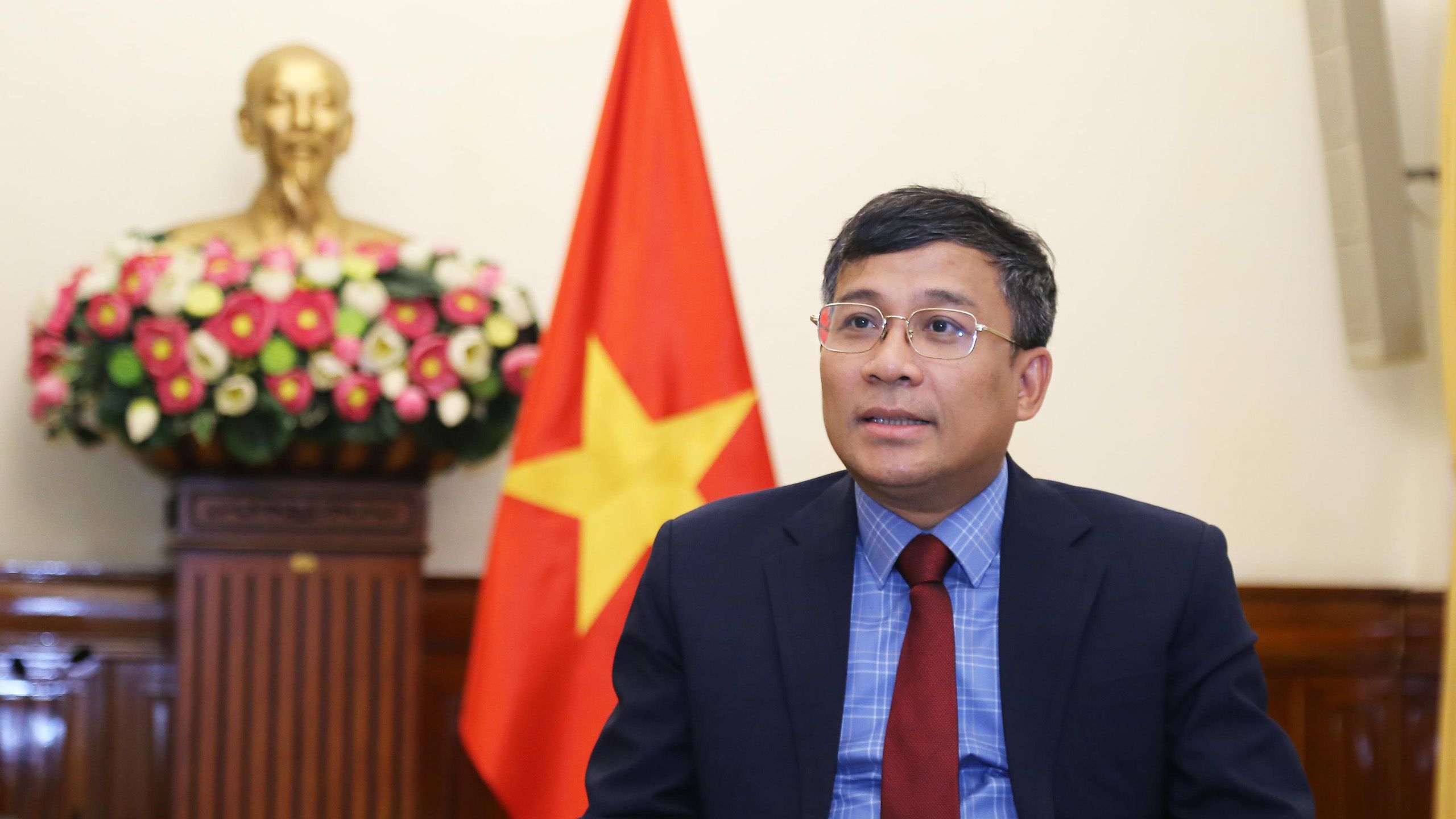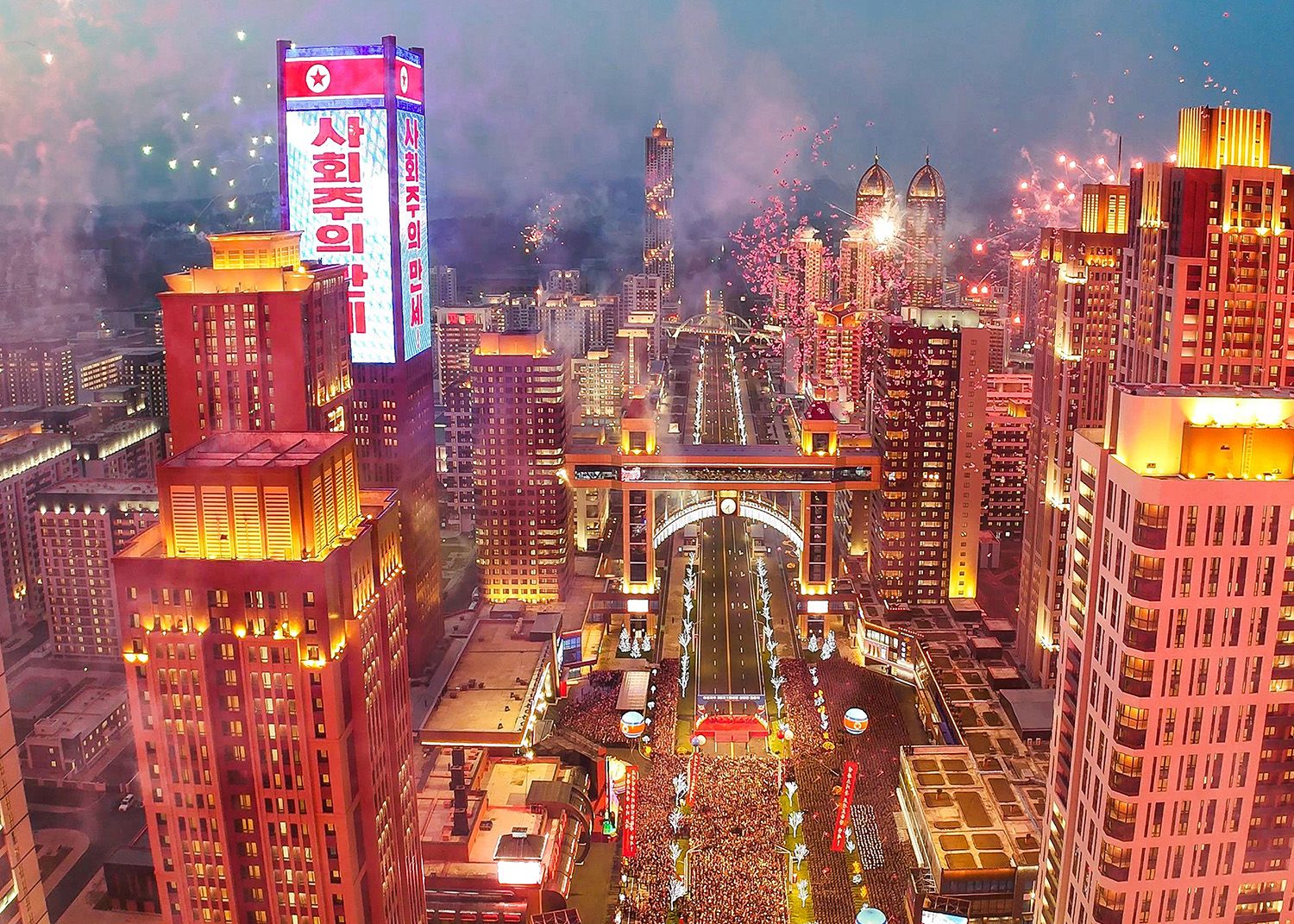A new historic milestone in Viet Nam - DPRK relations

At the invitation of Kim Jong Un, General Secretary of the Workers’ Party of Korea (WPK) and President of State Affairs of the Democratic People’s Republic of Korea (DPRK), General Secretary of the Communist Party of Viet Nam (CPV) Central Committee To Lam is paying a state visit to the DPRK and attending celebrations marking the 80th anniversary of the founding of the WPK from October 9 to 11.
This is General Secretary To Lam’s first visit to the DPRK in his capacity as the Vietnamese Party leader and marks the first visit by a CPV General Secretary in 18 years.
The visit takes place against the backdrop of an increasingly complex and unpredictable global and regional landscape, which has far-reaching impacts on the security and development environment of nations. Major-power relations and international alignments are undergoing significant adjustments. The Asia-Pacific and Indian Ocean regions continue to play an increasingly important role in global political and economic affairs, remaining focal points of major-power competition.
Meanwhile, the situation in the DPRK remains stable. The role and position of General Secretary and President Kim Jong Un and of the WPK have been constantly strengthened.
Since its founding on October 10, 1945, the WPK has convened eight national congresses. At its 8th Congress, held in January 2021, the DPRK affirmed its focus on developing and comprehensively expanding external relations, upholding the principle of reciprocity, strengthening solidarity and friendship with countries that respect the DPRK’s sovereignty.
The DPRK set out its five-year national economic development plan for the 2021-2025 period, reaffirming the spirit of “self-reliance and self-sufficiency”. The plan calls for building an economy that follows a clear, stable and independent roadmap, with a focus on developing the metallurgical and chemical industries while attaching importance to agricultural development.
In line with the direction adopted at the 8th Party Congress, the DPRK is focusing on socio-economic development through a people-centred policy. It continues to prioritise addressing pressing livelihood issues such as housing and food security, and is promoting the completion of 50,000 housing units in the capital Pyongyang during the 2021-2025 period.
The inauguration ceremony of 10,000 housing units in stage 3 of the plan to build 50,000 houses in Pyongyang, DPRK, on April 16, 2025. (Photo: Yonhap/VNA)
The inauguration ceremony of 10,000 housing units in stage 3 of the plan to build 50,000 houses in Pyongyang, DPRK, on April 16, 2025. (Photo: Yonhap/VNA)
Despite facing socio-economic difficulties due to embargoes and sanctions, the DPRK’s international position has continued to strengthen. Its leaders recently took part in the 80th anniversary of the World People’s Victory over Fascism, held in China. The DPRK has also been enhancing substantial cooperation with China and deepened its relations with Russia.
Inter-Korean relations remain tense but under control. The administration of the Republic of Korea President Lee Jae Myung remains committed to easing military tensions and promoting inter-Korean exchanges and cooperation to rebuild trust and foster a peaceful atmosphere on the Korean Peninsula.
Regarding DPRK–US relations, the US continues to maintain an open stance on dialogue with the DPRK.
The DPRK joined the ASEAN Regional Forum (ARF) in 2000 and signed the Treaty of Amity and Cooperation in Southeast Asia in 2008. The DPRK is a member of international organisations, including the United Nations, the Non-Aligned Movement, the World Health Organisation, and the Food and Agriculture Organisation of the United Nations.
On July 8, 1957, the people of the capital Pyongyang warmly welcomed President Ho Chi Minh who led the delegation of the Party and Government of Viet Nam on a friendship visit to the DPRK from July 8 to 12, 1957. (Photo: VNA)
On July 8, 1957, the people of the capital Pyongyang warmly welcomed President Ho Chi Minh who led the delegation of the Party and Government of Viet Nam on a friendship visit to the DPRK from July 8 to 12, 1957. (Photo: VNA)
President Ho Chi Minh received Premier Kim Il Sung, who led the delegation of the Party and Government of the DPRK on a friendship visit to Viet Nam from November 27 to December 3, 1958. (Photo: VNA)
President Ho Chi Minh received Premier Kim Il Sung, who led the delegation of the Party and Government of the DPRK on a friendship visit to Viet Nam from November 27 to December 3, 1958. (Photo: VNA)
Prime Minister Pham Van Dong and DPRK Premier Kim Il Sung signed the Viet Nam–DPRK Joint Statement on December 1, 1958, at the Presidential Palace in the presence of President Ho Chi Minh. (Photo: VNA)
Prime Minister Pham Van Dong and DPRK Premier Kim Il Sung signed the Viet Nam–DPRK Joint Statement on December 1, 1958, at the Presidential Palace in the presence of President Ho Chi Minh. (Photo: VNA)
The traditional friendship between Viet Nam and the DPRK, founded by President Ho Chi Minh and Chairman Kim Il Sung and continuously nurtured by successive generations of leaders of both countries, has been strengthened and developed, especially after the official friendship visit to Viet Nam by Kim Jong Un, Chairman of the Workers’ Party of Korea and Chairman of the State Affairs Commission of the DPRK, in March 2019.
Right after reopening its borders after the Covid-19 pandemic, the DPRK resumed several delegation exchange activities with Viet Nam. The two sides have maintained the Viet Nam-DPRK Inter-Governmental Committee on Economic, Scientific and Technical Cooperation mechanism, with the most recent 9th session held in Ha Noi in 2014. The two countries have also signed a number of important agreements.
In January 1955, Viet Nam decided to establish its embassy in Pyongyang, and in April 1955, the DPRK opened its embassy in Ha Noi. During the 1960s and 1970s, the DPRK helped Viet Nam in training hundreds of students. The two countries continue to promote the signing of cooperation agreements in the field of education.
General Secretary and State President To Lam receives Ambassador of the DPRK to Viet Nam Ri Sung Guk, who presented his letter of credentials on August 12, 2024. (Photo: VNA)
General Secretary and State President To Lam receives Ambassador of the DPRK to Viet Nam Ri Sung Guk, who presented his letter of credentials on August 12, 2024. (Photo: VNA)
Viet Nam has also sent many art troupes to the DPRK to participate in the April Spring Friendship Art Festival held in Pyongyang. In 2019, the Viet Nam National Art Troupe visited and performed in the DPRK as part of a friendship exchange. During the time the DPRK had closed its border, the Ministry of Culture, Sports and Tourism of Viet Nam still directed delegations to attend the April Spring Friendship Art Festival online, winning many high prizes. In 2019, a Vietnamese martial arts delegation and the Ha Noi Football Club visited and held exchange activities with the DPRK. Most recently, the Ministry of Culture, Sports and Tourism of Viet Nam invited Taekwondo masters of the DPRK to perform in Viet Nam.
Taking place while Viet Nam and the DPRK are jointly organising activities to mark the 75th anniversary of diplomatic relations (January 31, 1950 – January 31, 2025) and designating 2025 as the “Viet Nam–DPRK Friendship Year”, as well as in the context of the DPRK “normalising its external activities” after the Covid-19 pandemic, the state visit to the DPRK by General Secretary To Lam to attend the 80th founding anniversary of the Workers’ Party of Korea continues to affirm Viet Nam’s foreign policy of independence, self-reliance, multilateralisation, and diversification of foreign relations, with proactive and active international integration in a comprehensive, deep, and effective manner.
The Embassy of the DPRK in Viet Nam held a solemn reception on February 6, 2025, to mark the 75th anniversary of the establishment of diplomatic relations between the Socialist Republic of Viet Nam and the DPRK (Photo: VNA)
The Embassy of the DPRK in Viet Nam held a solemn reception on February 6, 2025, to mark the 75th anniversary of the establishment of diplomatic relations between the Socialist Republic of Viet Nam and the DPRK (Photo: VNA)
With the General Secretary of the Communist Party of Viet Nam’s state visit to the DPRK and his attendance at the ceremony marking the 80th anniversary of the founding of the Workers’ Party of Korea, Viet Nam continues to reaffirm its respect for the traditional friendship with the DPRK. Viet Nam supports the DPRK in developing its economy and improving the living standards of its people, while also seeking to contribute to dialogue and the establishment of lasting peace on the Korean Peninsula — thereby helping to maintain peace, stability, cooperation, and development in the region and the world. This visit also highlights Viet Nam’s socio-economic achievements, as well as its potential, advantages and opportunities in the new era; reaffirming the country’s determination and efforts to realise its growth targets and strategic orientations in the new era.

According to Standing Deputy Minister of Foreign Affairs Nguyen Minh Vu, the General Secretary’s state visit to the DPRK and participation in the 80th founding anniversary of the Workers’ Party of Korea carry three particularly important meanings and purposes.
Firstly , the visit continues to reaffirm Viet Nam’s consistent foreign policy of attaching great importance to relations with traditional friends. The DPRK was among the first countries in the world to establish diplomatic relations with Viet Nam (in 1950). This traditional friendship was painstakingly fostered by President Ho Chi Minh, President Kim Il Sung, and successive generations of leaders of both nations. During Viet Nam’s struggle for national liberation, the DPRK stood side by side with Viet Nam and extended valuable assistance. In turn, Viet Nam has also consistently supported and stood alongside the DPRK during its difficult times.
Secondly, the visit represents a highly significant occasion for the top leaders of the two parties and the two countries to exchange views and reach consensus on strategic orientations aimed at inheriting and promoting the traditional friendship between the two parties and states. It also seeks to strengthen bilateral cooperation in the new period, in accordance with relevant international regulations and in line with the aspirations and expectations of the peoples of both nations, particularly in such areas as health, culture, sports, people-to-people exchanges, and agricultural cooperation.
The Viet Nam–DPRK Friendship Kindergarten, established in the Trung Tu collective area (Ha Noi) on March 8, 1978, with financial assistance from RDRK, stands as a symbolic project of the friendship between the two countries. (Photo: VNA)
The Viet Nam–DPRK Friendship Kindergarten, established in the Trung Tu collective area (Ha Noi) on March 8, 1978, with financial assistance from RDRK, stands as a symbolic project of the friendship between the two countries. (Photo: VNA)
Thirdly, as an active and responsible member of the international community, through this visit, Viet Nam continues to demonstrate its consistent support for global and regional efforts, trends, and contributions towards peace, stability, and cooperative development on the Korean Peninsula, in the region, and across the world.
Assessing the Viet Nam–DPRK relationship in recent years, Deputy Minister Nguyen Minh Vu affirmed that despite certain objective difficulties arising from the regional and international context, the traditional friendship and enduring desire for cooperation between the two countries have enabled their relations to develop in a stable and solid manner, achieving numerous encouraging and remarkable outcomes.
The state visit to DPRK by General Secretary To Lam to attend the ceremony marking the 80th anniversary of the founding of the Workers’ Party of DPRK marks a new historic milestone in the relations between the two parties and the two countries, contributing to their continued advancement. With the goodwill and efforts of both sides, Viet Nam firmly believes that this historic visit will bring about new achievements in bilateral relations. The occasion also serves as an important opportunity for both sides to engage in substantive, sincere, and candid exchanges on regional and international issues of shared concern, and to make constructive and responsible contributions to promoting dialogue, maintaining peace, and fostering cooperation and development on the Korean Peninsula, in the region, and in the wider world.
Published: October 8, 2025
Production Manager: Chu Hong Thang – Pham Truong Son
Content: Son Ninh – Thanh The
Design: Nha Nam






